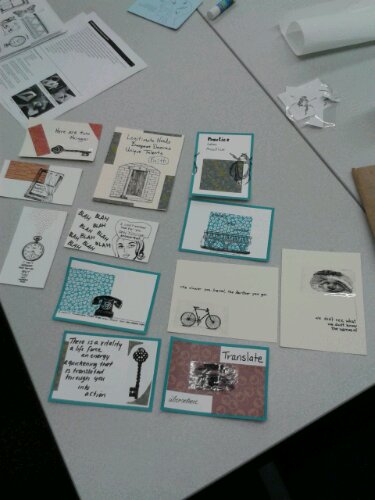You might have been wondering whatever happened to those academic mantras I was collecting in spring? Well, after my two months weaving at Penland, I went back to the Massachussetts College of Liberal Arts (MCLA) in May to catch up with both students and faculty I had met in January. But mainly I was doing a residency at Press, MCLA’s letterpress studio. While I had hoped to set a lot of the mantras I had collected, I only managed two more (on top of the Process Doesn’t Get You Extra Credit one I had done in January), but one of the reasons for that was that I also printed some work that came out of my time weaving, where I had played around with a fingerprint motif as a symbol for identity.
This was a time of me thinking about my work, both in the context of university work and creative practice, if and how they link, and in a way it is only fitting that it was the process of making that allowed me to figure out that I am on the right track. I don’t want to bore you all with too much self-confessional dribble, so in this post I will give you a short overview of the finished exhibition, and then write a bit about how this has given me a new idea for my teaching.
The exhibition was called ‘What’s Your Mantra – An exploration of Creative and Academic Identities’, and it had three main parts to it. There were my three selected and set academic mantras – Process Doesn’t Get You Extra Credit, Start With The Box and Tangential Procrastination (which isn’t really a mantra as such, but a phenomenon I struggle with in my own work and a concept I refer to a lot when teaching) -, there were the academic mantra cards myself and colleagues at MCLA had done over the course of the term, representing what we were thinking about during this time, and then there were a series of paper fingerprints, some of them woven. (If you want to know more about the exhibition, check out the PRESS blog here and here.)
As I said, this work was very important for me. Making it gave me a tactile way of working through a lot of questions I had been asking myself, even if I wasn’t really aware of it. It made me think of the different ‘hats’ I wear – teacher, researcher, writer, designer, artist – and how they all weave together to one identity. In a lot of the workshops I have been to we are exploring thinking through making, and this was an extended experience of that.
But what I take away from this is not only all these deep experiences for my own personal development, I have also stumbled across something that might prove useful for my teaching, a development of the academic mantra.
The mantra cards are in a way word paintings. The ones I made were all inspired by the context of my day-to-day teaching, which is what made me think about them as academic mantra cards in the first place. Working on them allowed me to recognise the significance of that concept, the academic mantra, for the way I practice. Boiling down your expertise and guidance to the most crucial points can be a good way to connect with students that seem to want everything in little chunks. Not that I am in favour of only presenting little chunks to students, but I like the idea of a snappy headline, that you then elaborate on.
I have gone away from the term of the ‘academic mantra’ because of associations of meditation and really a mantra should be something that works on a different level than lessons at university. But when talking about my exhibition another term came out: visual soundbite. I think that’s what they are. And I think the experience of boiling down the crucial points to a snappy few words and then finding a visual representation for it is a good exercise. Not just for me, when thinking about how to present lessons, but also for students.
Note-taking, I believe, is much more effective if you make it personal to you. It should reflect your thoughts and questions as well as the content of what you are taking notes from. In the work with reflective books made with collage this is particularly so, the content becomes meaningful because you develop personal associations, which aid your recall. Students, particularly in their first-year undergraduate degree, find this hard to grasp. Maybe this is down to being trained to memorise facts at school, but in my opinion, university isn’t so much about the facts (which you can look up again anyway), it is about developing the ability to think independently and critically. For that you need to be able to take notes that are useful to you, and you need to be able to identify which bits of these are the most important.
So, this term I have set two of my classes the challenge to each make a visual soundbite each week reflecting on the most important thing they have learnt in that week. I explain that producing a polished visual is not that important, they could use a rough sketch, collage something or use a found image. I have seen a few of these already, and can only say that it is eye-opening what students identify as the important things they are learning. Hardly even the things I want them to take away from a lesson… So not only is this turning out to be a good exercise in focus for the students, it is also a way for me to collect feedback on what is going on in their learning process.
I’ll keep you posted!











